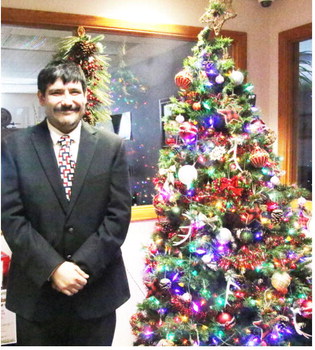Lawmakers Push Back As Senator Calls For Investigation Into Reservation Alternatives
A draft joint resolution from Sen. Keith Regier, R-Kalispell, aims to push Congress to investigate “alternatives” to American Indian reservations, arguing they have “failed to positively enhance the lives and well-being of most of the Indians or the other citizens of the State of Montana.”
“Is there a better way of supplying for these Indians than through the reservation system we have set up now?” Regier said in an interview last week.
The resolution requested by Regier, which has yet to be formally introduced but which was released Monday, Jan. 2, drew immediate feedback from multiple Indigenous Montana lawmakers.
In Montana, there are 12 sovereign tribes, eight of which are federally recognized and seven of which have reservations.
Sen. Shane Morigeau, D-Missoula, who is Salish and Kootenai, said in an interview the resolution was “riddled with fallacies and misinformation” and that he felt it was aimed at continuing a legacy of “atrocious policies” from the government, which he said has not held true to the treaties that were agreed upon before Montana became a state.
“If the U.S. did a better job of upholding their end of the agreements, some of these statistics would be lower,” he said. “It’s the fact that we have broken promises, where the government has never upheld its end of the bargain.”
In a statement he sent to his supporters and shared with the Daily Montanan, Rep. Jonathan Windy Boy, D-Box Elder, who is Chippewa Cree, said Indigenous peoples have been “under attack” for centuries and the resolution “is proof we are still under attack with the same circumstances our forefathers have endured, and it seems like it’s getting worse.
“These types of attacks on our people have been written in history. We must keep on pushing back and fighting for our future generations as our forefathers have done for us.”
The draft resolution says for most of the state’s American Indian citizens, the reservation system has caused drug abuse, alcoholism, domestic violence and welfare dependence “resulting in a lack of opportunity for their future well-being and happiness.”
Regier said in an interview the idea came to him from constituents who had concerns about reservations and that he thought asking Congress to investigate if there was a better alternative was the correct response.
He said he wants Congress to look into whether the reservation system is causing the issues listed in the draft resolution or if it is the inverse — that the issues are making reservations look like they are the root cause.
“Reservations are not a state issue, right? It’s a federal issue. But because the reservations are here, it does affect the state,” Regier said. “So, it’s just — Congress, let’s take a look at it. Is there a better way of serving these people? And if so, let’s do it.”
The resolution says “the Indian reservation system is a policy based entirely on race,” though the U.S. Supreme Court has on multiple occasions ruled that the federal government’s relationships with American Indian tribes are political and not racial in nature. The court ruled in the 1974 Morton v. Mancari decision that the federal government’s special treatment of American Indians is political and not racial when it “can be tied rationally to the fulfillment of Congress’ unique obligation toward the Indians.” That holding was reaffirmed in 1977 in United States v. Antelope.
Regier, when told the high court had ruled contrary to what his resolution says, said that since reservations supply the tribes specifically, that is a form of discrimination.
“By the treaties set up, it’s that group of people, so it’s all about them. So that would be that race component,” Regier said.
The draft resolution says the reservation system “is not in the best interests of either the Indians inside our borders or for our common Montana citizens.”
It also says investigation of alternative approaches to reservations would promote “peace, harmony, and stability for all.”
The draft calls on the U.S. Congress to investigate alternatives to the reservation system as soon as possible and to report back to Montana’s legislature and those of any other state on its progress.
Regier said he had not spoken with other Montana legislators about the resolution, nor any lawmakers from other states where reservations exist, but that he plans to. He says he believes it will be formally introduced at some point this session but is not sure whether it will move beyond that. Sen. Shane Morigeau, D-Missoula, who is Salish and Kootenai, called the draft resolution “anti-Indian legislation” and said he would bring a bill this session to require Indian Education for all legislators.
Montana’s Constitution says the state “recognizes the distinct and unique cultural heritage of American Indians and is committed in its educational goals to the preservation of their cultural integrity.”
And Montana Code Annotated codified Indian Education for All, which states that every Montanan be encouraged “to learn about the distinct and unique heritage of American Indians in a culturally responsive manner.”
Windy Boy said in an interview he believes some Republicans feel empowered and emboldened to present a “me versus you or us versus them” attitude since former President Donald Trump’s election. Though he said he sees the resolution as “a bunch of BS,” he said he is acclimated to such measures after years in the Senate and House.
“People change the laws to appease themselves,” he said.
Morigeau said he is serious about the civics education bill, saying he has experienced Indigenous stereotypes throughout his life from people he feels are uneducated about the history of the land and nation.
“I hope people kind of check their privilege and the things they benefit from in this state and country when they say these things,” he said. “A lot of the things they have and continue to have is off the fat of Indian lands.”


